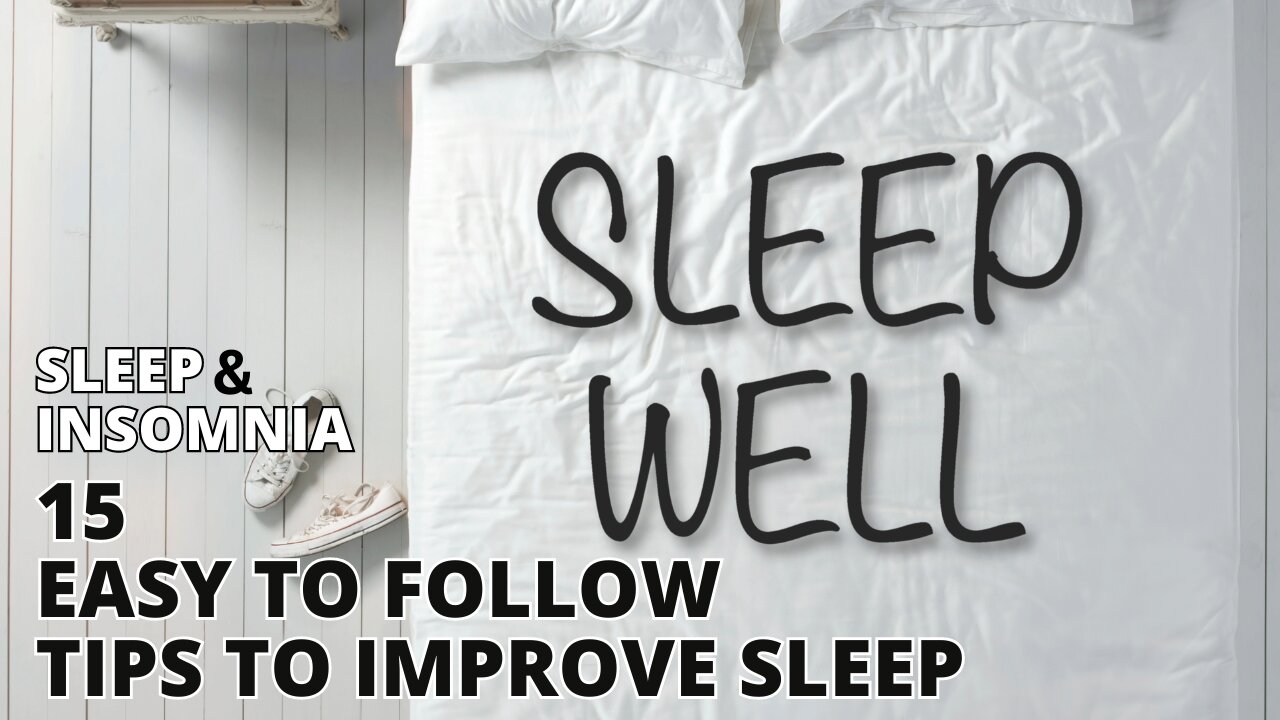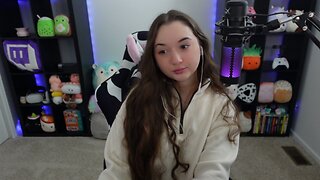Premium Only Content

Treating Insomnia 15 Tips To Improve Sleep
Today's Daily Dose is partly brought to you by
Grassdoor.com cannabis delivered fast SAVE 40% OFF Your Entire Purchase USE CODE: DAILY @ Checkout and
by Social CBD discover the power of this cannabinoid it may aid with stress, mood and sleep
https://socialcbd.pxf.io/n1GAJo
by Audible discover and enjoy a vast collection of audiobooks, stories and more save now on your first months subscription.
https://www.audibletrial.com/e462rj
If you want to help support this channel and the content please consider checking out my website TheDailyDose.co
You can also checkout these Top 5 Best Natural Health Remedies
https://5bestnaturalremedies.com/?id=6411ea08fb3fa87c9ee0f0b3
Are you having trouble falling asleep or staying asleep? Do you find yourself waking up several times throughout the night and feeling tired during the day? If so, you may be experiencing insomnia. Insomnia is a common sleep disorder that affects millions of people worldwide. In this article, we will explore the causes, symptoms, and treatments for insomnia.
What is Insomnia?
Insomnia is a sleep disorder characterized by difficulty falling or staying asleep. It can be short-term (acute) or long-term (chronic). Acute insomnia is typically caused by stress, anxiety, or other temporary factors, and lasts for a few days or weeks. Chronic insomnia, on the other hand, is a more serious condition that lasts for at least three months.
Sleep is essential for our overall health and well-being. However, according to the National Sleep Foundation, nearly 70 million Americans suffer from sleep disorders. Lack of sleep can cause mood swings, decreased productivity, and even chronic health issues like high blood pressure and heart disease. In this article, we will provide you with 15 tips on how to sleep better and achieve a restful night.
1. Establish a Sleep Schedule
Creating a regular sleep schedule can help your body adjust to a routine, making it easier to fall asleep and wake up. Aim for at least seven hours of sleep per night, and try to go to bed and wake up at the same time every day, even on weekends.
2. Avoid Stimulants
Avoiding caffeine, nicotine, and alcohol before bedtime can help you sleep better. These substances can disrupt your sleep patterns, making it harder to fall asleep and stay asleep.
3. Create a Relaxing Environment
Your bedroom should be a peaceful and relaxing environment. Keep the room cool, dark, and quiet, and remove any distractions that could keep you up at night. Invest in comfortable bedding and pillows to ensure maximum comfort.
4. Wind Down Before Bedtime
Develop a relaxing bedtime routine to help your body and mind prepare for sleep. This could include taking a warm bath, reading a book, or practicing meditation or deep breathing exercises.
5. Limit Screen Time
The blue light emitted from electronic devices like smartphones and laptops can interfere with your body's natural sleep rhythms. Try to limit screen time before bed, and avoid using electronic devices in the bedroom.
6. Exercise Regularly
Regular exercise can help improve sleep quality and reduce symptoms of insomnia. Aim for at least 30 minutes of moderate-intensity exercise per day, but avoid exercising too close to bedtime as it can stimulate your body and make it harder to fall asleep.
7. Watch Your Diet
Eating a balanced diet can help improve sleep quality. Avoid heavy, spicy, or sugary foods before bedtime, and aim to eat a light snack if you're hungry.
8. Manage Stress
Stress and anxiety can keep you up at night. Try to manage your stress levels by practicing relaxation techniques like yoga, meditation, or deep breathing exercises.
9. Get Comfortable
Ensure your sleep environment is comfortable and supportive. Invest in a good quality mattress, pillows, and bedding to improve your sleep quality.
10. Try Aromatherapy
Certain scents like lavender and chamomile are known for their calming properties and can help you relax and fall asleep. Consider using essential oils or aromatherapy products in your bedroom.
11. Use White Noise
White noise machines can help mask any background noise that could disrupt your sleep. Alternatively, try using a fan or earplugs to create a more peaceful sleeping environment.
12. Avoid Daytime Napping
Napping during the day can disrupt your sleep patterns, making it harder to fall asleep at night. If you must nap, keep it short (less than 30 minutes) and avoid napping too close to bedtime.
13. Seek Medical Help
If you've tried all the above tips and still struggle with sleep, consider seeking medical help. Your doctor may recommend sleep aids or suggest further tests to diagnose any underlying sleep disorders.
#sleep #sleepaids #sleepmedication #insomnia #learnaboutinsomnia #insomniainfo #insomniaeducation #howtoimprovesleep #besttipsforsleep #alternativehealing #herbalsupplements #healthandwellness #naturalmedicines #plantmedicines #learnaboutplantmedicines #thedailydose #wickedsources
-
 7:10
7:10
News And Media
1 year agoTop 5 Nootropics For Brain Fog
325 -
 LIVE
LIVE
Chi-Town Gamers Livestreams
2 hours agoBaldur's Gate 3 Ep. 15 W/ CTG & @XayRico | Pre-Show = COD & Variety Gaming Later
31 watching -
 LIVE
LIVE
ttvglamourx
3 hours ago $0.08 earnedGLAMOURX VS SIEGE LOBBIES !DISCORD
78 watching -
 18:52
18:52
Stephen Gardner
22 hours ago🚨I CAN’T Believe What Happened To Trump!
46.3K513 -
 8:22
8:22
nospeedlimitgermany
8 hours ago $0.03 earnedHonda Civic Type R EP3 | 200 PS | Top Speed Drive German Autobahn No Speed Limit POV
168 -
 1:31:54
1:31:54
Barry Cunningham
5 hours agoBREAKING NEWS: PRESIDENT TRUMP INTERVIEW WITH MARIA BARTIROMO!
44K47 -
 12:57
12:57
Bearing
6 hours agoFlorida Proposes ALLIGATOR ALKATRAZ 🐊 The Young Turks CRY About it 🤣
1.43K28 -
 8:17
8:17
Damon Imani
21 hours agoDamon SCHOOLS The View Hosts For 8 Minutes Straight! | Best Moments Compilation Vol.14
9956 -
![ASMR In Public! [Tapping, Scratching, Crinkling Sounds!]](https://1a-1791.com/video/fww1/9c/s8/1/_/c/E/X/_cEXy.0kob-small-ASMR-In-Public-Tapping-Scra.jpg) 9:59
9:59
Lacey Mae ASMR
18 hours ago $0.02 earnedASMR In Public! [Tapping, Scratching, Crinkling Sounds!]
208 -
 16:24
16:24
Tundra Tactical
20 hours ago $0.22 earnedGeorgetown University EXPOSES Shocking Firearm Use Stats!
8511